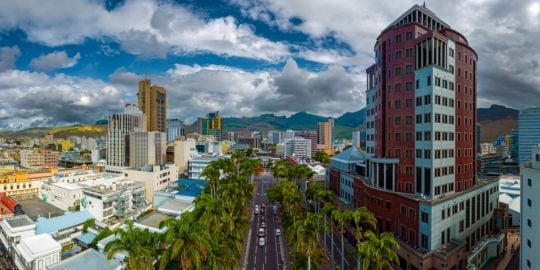How to find a job in Mauritius

For expatriates, finding a job in Mauritius needs not be daunting: it is possible to apply from abroad. Nevertheless, it is strongly advised to be on the island to have a better, hands-on idea of the labor market and to take advantage of a network that has proven its worth: word-of-mouth.
If you have a specialized profile, do not hesitate to call upon the services of a headhunter, whose network will be particularly extensive. What's more, this professional is often also aware of hidden opportunities, i.e., not advertised to the public but still available.
As for LinkedIn, update your profile by indicating your openness to professional opportunities. To increase its visibility, change your location to Mauritius so that recruiters and companies can find you more easily.
Where to search for jobs in Mauritius?
Expatriates in Mauritius and remote work
Mauritius has recently been elected as the ideal destination for remote work. Indeed, due to its efficient management of the Covid pandemic, the 4G connectivity, and the arrival of the 5G, remote workers have all the necessary tools to work serenely.
Being a digital nomad in Mauritius
It is possible for non-residents to work from Mauritius for a company located abroad. For this, there is the Premium Visa, free of charge and valid from 6 months to 1 year, with the possibility of renewal.
In return, the applicant agrees not to enter the Mauritian labor market, to have a main place of business and main source of income and profits outside Mauritius, and to prove through documents the purpose of stay, accommodation, etc.
Freelance work from Mauritius as an expatriate
To work as a freelancer from Mauritius as an expatriate, you just need to opt for the status of self-employed person and apply for the Self-Employed Occupation Permit. To obtain this visa, which is valid for 10 years and renewable, you must make a minimum investment of 35,000 USD, generate an annual income of Rs 800,000 from the third year of registration and pay the application fee of 1,000 USD following the approval of the application.
CV and cover letter to work in Mauritius
The CV to apply for a job in Mauritius can be written in English or French. You will need to research the company to know which language is most appropriate in particular cases. It should also contain the following information:
- Name / Address, city, state, zip code / Phone number / Email address;
- Personal information: date of birth;
- Education and experience: dates / major subjects / details of degrees, training and certification / high school / university / college / technical school;
- Academic Qualifications: High School / Tertiary Level / Technical Qualifications / Additional Qualifications (e.g., computer literacy)
- Work Experience: List in chronological order, details of each position and dates / Work History / Academic positions / Institution or company name.
As for the cover letter, it should contain a short explanatory text, e.g., “Dear Sir/Madam, I am writing to apply for the position of xxxxx advertised on xxxxxx. As requested, I am enclosing my certification, resume and three references”.
Resume: Tips from the Ministry of Labor, Human Resource Development and Training
- Use figures to illustrate your achievements;
- Focus on the most relevant and significant elements of your professional and academic career;
- The document should help the reader to find information quickly to conclude if you are a potential candidate;
- Your resume should focus on your achievements and skills;
- Mention your 2 or 3 most relevant strengths and illustrate them with experiences and achievements;
- Present yourself as a professional with a simple email account and, if applicable, a website that highlights your relevant skills and achievements;
- Include your current home address, a personal email address and a personal phone number;
- In Mauritius, a one-page CV is considered too short. Two pages may not be enough to cover a full career. Three pages is the limit.
- Include information about any advanced degrees, such as MBAs or executive programs you have attended;
- Explain any significant breaks in your career or education;
- Identify keywords from the job description and repeat them in your resume. Let the employer know that you have the specific skills mentioned;
- Include references (who have credentials - former employers, teachers and professors) and let them know they will be contacted by one or more companies in Mauritius. Send them a copy of your CV;
- Interests: keep it brief, unless the interest can be an added value for the job you are interested in.
The cover letter
As for the cover letter, like everywhere else, it is meant to support the CV and to make the link with the position you are interested in. Written in French or English, depending on the language of the CV, personalized and adapted to each application, it should highlight your personal motivations, but above all, your interest in the company in Mauritius on a maximum of one page.
What are the salaries in Mauritius?
The World Bank classified Mauritius as a high-income country for the first time in July 2020.
According to Statistics Mauritius, in 2021, the average salary of a private sector employee was around Rs 16,000 per month and less than Rs 16,200 for 50% of manual workers.
In the private sector, top management earned an average of at least Rs 39,800 per month.
However, the EDB (Economic Development Board) reminds us that in order to obtain an Occupation Permit, an expatriate employee must earn a monthly basic salary of at least Rs 60,000.
For expatriates working in ICT, BPO, pharmaceutical manufacturing, food processing and fund accounting and compliance services, the monthly basic salary must be at least Rs 30,000.
It is difficult to indicate an average salary for expatriates as it depends on the negotiation between the candidate and the potential employer. Nevertheless, many factors such as rent, travel, school fees, annual travel home, food, etc. should be taken into consideration before offering or accepting a figure.
A quick note on inflation in Mauritius
According to Statistics Mauritius, inflation stood at 11% in July 2022, followed by an increase of 0.6 points or 0.5% between August and September to reach 11.9% in September.
Labor Code in Mauritius
The Labor Code is governed by the Ministry of Labor through the Workers Rights Act 2019. The provisions of the Workers Rights Act 2019 are, amongst others:
- The legal length of a workday is 8 hours, excluding a 1 hour lunch break;
- Overtime is paid as agreed with the employer. When working on a holiday, one is paid twice.
- After 12 months with the same employer, you will be eligible for 22 days of annual leave and 15 days of sick leave.
Do not hesitate to consult the Ministry of labor's website for more information.
Work contract in Mauritius
In Mauritius, employers must scrupulously respect labor laws when hiring expat employees. The salary and conditions of employment of expatriate employees must not put them at a disadvantage compared to local employees.
Expatriate employees must also be paid exclusively in Mauritius and in Mauritian rupees.
Furthermore, the employer must not make any deduction from the salary/remuneration of an expatriate employee unless the deduction is provided for and authorized by labor laws. This includes compulsory deductions, pension contributions and tax contributions.
All terms and conditions of employment and related benefits must be clearly stipulated in the employment contract, which must be duly signed by the expatriate and the employer. A copy must be given to the employee:
- the expatriate's situation;
- the conditions relating to the days and hours of work;
- the conditions of payment of salaries, overtime;
- the conditions of payment for days and hours worked on Sundays and holidays;
- conditions of payment of year-end bonuses;
- the duration of meals and breaks;
- specification of annual leave, sickness and maternity leave;
- conditions in case of termination of the employment contract, notice;
- additional provisions for housing, airfare, car.
Working hours and vacations in Mauritius
The Mauritius Labor Code provides that:
The normal working week for any employee who is not a part-time employee or a caregiver consists of 45 hours of work, except in special situations or other provisions. A caregiver (known in French as a garde malade) in Mauritius is a professional who cares for the sick and the elderly. This does not include time for meals, tea breaks and other intervals.
The employer and the employee can decide on the number of overtime hours worked by the employee.
Employees are entitled to at least one rest day of at least 24 hours in seven days.
If the job requires five days of work per week, the employee must work nine hours every five days of the week, excluding holidays.
If the job requires six days of work per week, the employee must work eight hours on five days of the week and five hours on the remaining day, excluding holidays.
The employer may not require the employee to work nights for five consecutive nights, with the exception of certain sectors and industries.
An employee may request a flexible work schedule for reasons such as the impossibility of reorganizing the work or if the quality of the work is compromised if the employer is able to grant such an arrangement.
Good to know:
In Mauritius, an employer cannot hire a minor to work between 10 p.m. and 5 a.m.
Different types of leave in Mauritius
Leaves are included in the benefits employees have as part of their remuneration and require the employer's authorization.
In Mauritius, one can be absent from work, with the permission of the employer, to carry out recreational and rest activities, to fulfill personal and religious obligations, for continuous learning and development purposes, to maintain good physical and mental health, to improve work-life balance.
Employees can benefit from various types of leave, including:
Annual leave: full-time employees are entitled to 20 days of annual leave per year. They are also entitled to 2 additional days of leave per year, the dates of which are at the discretion of the employer. This leave may be taken for a full day, half-day, or a shorter period agreed upon by the employer and employee.
Any employee who has been employed full-time by the same employer for a period of 6 consecutive months and who has been present every working day during that period is entitled to one day of annual leave for each month thereafter until the 12th month, so long as he or she remains employed by the same employer.
Sick leave: Any full-time employee continuously employed by the same employer for a period of 12 consecutive months is entitled, during each subsequent 12-month period of continuous employment, to 15 working days of sick leave on full pay. When an employee has unused sick leave days at the end of the year, these remaining days are cumulative to a maximum of 90 days and are non-refundable. They may be used for extended convalescence or hospitalization. The maximum 90-day cap on the accumulation of outstanding sick leave for workers earning a monthly basic salary of Rs 50,000 or less has been removed.
Maternity and paternity leave: Women are generally entitled to 12 weeks of paid maternity leave, 6 of which must be taken before the birth and 6 weeks after. They are entitled to full pay if they have been employed for more than 12 months. Fathers are entitled to 5 days of paid paternity leave.
Leave to care for a sick child: an employee with a basic monthly salary of Rs 50,000 or less is entitled to take up to 10 days of paid leave during each period of 12 consecutive months, to be charged against annual leave, sick leave or vacation leave, at their convenience.
Adoption leave: when an employee continuously employed by the same employer for a period of 12 consecutive months adopts a child under the age of 12 months, they are entitled, upon presentation of a certified copy of the court order and a copy of the child's birth certificate, to 14 weeks leave with full pay.
Leave for miscarriage and stillbirth: When an employee has a miscarriage duly certified by a physician, she is entitled to 3 weeks' leave with full pay immediately following the miscarriage. When an employee gives birth to a stillborn child, she is entitled, upon presentation of a medical certificate, to 14 weeks' leave with full pay.
Vacation (Leaves): this is 30 days of leave granted by the employer to an employee who has 5 years of continuous service with the same company. The employee is allowed to use all or half of his/her vacation days for a stay abroad. The counter resets to zero as soon as they are used for another 5 years.
Leave to attend court: an employee earning less than Rs 600,000 per annum who is summoned to court as a witness or a stakeholder is entitled to full pay leave only if the employee is attending court as a representative of the employer or on behalf of the employer.
The work culture in Mauritius
Punctuality, respect of rules and of hierarchy are required within the company.
As far as greetings are concerned, a handshake is welcome, but over time, at least with close colleagues, it will give way to a kiss on the cheeks. As a reminder, however, in pandemic times, physical contact is not recommended.
As for the dress code, it is advisable to opt for a chic and sober wardrobe, even in summer. You should also know that the vast majority of companies are equipped with air conditioning!
Don't be surprised if you are asked about your religion! Here, the question is part of the local habits and is not discriminatory.
As for the language spoken in the workplace, it can be French, English or Creole. In any case, Mauritians always make the effort to include everyone and will switch to French or English should you understand one or the other.
Remote work or at least a hybrid system, is slowly starting to enter the professional practices in Mauritius. However, it is unlikely that you will be given the opportunity to work remotely from the very first days of your employment.
Useful links:










